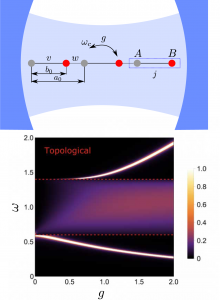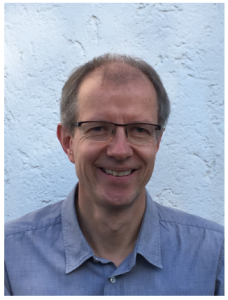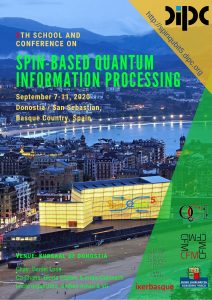Group Seminar: Controlling Topological Phases of Matter with Quantum Light
Olesia Dmytruk, from the CNRS, Collège de France, PSL Research University, Paris
Date: November 22, 2022, 12:00h
Location: Instituto de Ciencias de Materiales de Madrid (ICMM-CSIC), Salón de Actos
Abstract:

Controlling the topological properties of quantum matter is a major goal of condensed matter physics. A major effort in this direction has been devoted to using classical light in the form of Floquet drives to manipulate and induce states with non-trivial topology. A different route can be achieved with cavity photons. In this talk, I will discuss a prototypical model for topological phase transition, the one-dimensional Su-Schrieffer-Heeger (SSH) model, coupled to a single mode cavity [1]. I will demonstrate that quantum light can affect the topological properties of the system, including the finite-length energy spectrum hosting edge modes and the topological phase diagram. In particular, I will show that depending on the lattice geometry and the strength of light-matter coupling one can either turn a trivial phase into a topological one or vice versa using quantum cavity fields. Furthermore, the polariton spectrum of the coupled electron-photon system contains signatures of the topological phase transition in the SSH model.
References:
[1] Olesia Dmytruk and Marco Schiró, Controlling topological phases of matter with quantum light, arXiv:2204.05922.
Group Seminar: Illuminating van der Waals materials: from graphene to twisted MoS2
Marta Prada, from the Institute for Theoretical Physics, Universität Hamburg, will give a seminar entitled «Illuminating van der Waals materials: from graphene to twisted MoS2».
Date: October 11th, 2022, 11:00h.
Location: Instituto de Ciencias Materiales de Madrid (ICMM-CSIC)
We address the low-lying energy levels of van-der Waals structures via resistively-detected electron spin resonance (ESR). In graphene, the structure of the topological bands is reflected in transport experiments, where our numerical models allow us to identify the resonance signatures. We resolve the intrinsic spin-orbit gap [1], the g-factor anisotropic corrections [2, 3], the sub-lattice splitting [4], and the hyperfine-induced splitting in 13C-based graphene [5]. Using Floquet formalism, we find theoretical evidence of a topological transition by illuminating an ideal sample of graphene and the connection between angular momentum and sublattice spin. Finally, we study twisted MoS2 samples, where we resolve low-lying Moiré bands near the conduction band.
Keywords: Twisted bilayer MoS2, Moiré, superlattices, Mini-bands, Schottky barrier, Resonant Tunneling,
Transition metal dichalcogenides
[1] J. Sichau, M. Prada, T. Anlauf, T. J. Lyon, B. Bosnjak, L. Tiemann, and R. H. Blick, Phys. Rev. Lett. 122, 046402 (2019).
[2] M. Prada, L. Tiemann, J. Sichau and R. H. Blick. Phys. Rev. B 104, 075401 (2021).
[3] M. Prada, Phys. Rev. B 103, 115425 (2021).
[4] R. Singh, M. Prada, V. Strenzke, B. Bosnjak, T. Schmirander, Lars Tiemann, and Robert H. Blick. Phys. Rev. B 102, 245134 (2020).
[5] V. Strenzke, Phys. Rev. B 105, 144303 (2022).
Seminar: «Introduction to machine learning and its applications in scientific research
Lamberto Oltra Nieto, a member of our group, will give a seminar entitled «Introduction to machine learning and its applications in scientific research».
Date: March 9th, 2022, 10:00 h.
Location: online
Abstract: Nowadays, the importance of new technologies, more specifically artificial intelligence, in science is undeniable and must be taken into account in new scientific research. This seminar aims to be an introduction to the basics of machine learning with the objective of highlighting this importance in research. Applications in various fields such as error correction in different quantum systems or material research will also be discussed.
Seminar: «Hole spin qubits in elongated quantum dots»
Mónica Benito, from the Institute of Quantum Technologies, German Aerospace Center (DLR), Ulm, will give a seminar entitled «Hole spin qubits in elongated quantum dots».
Date: March 9th, 2022, 11:00 h.
Location: Instituto de Ciencia de Materiales de Madrid (ICMM-CSIC)
Abstract: Rapid development has positioned quantum wells in planar germanium heterostructures at the head of semiconductor quantum dot platforms for quantum information processing [1,2]. We find nuclear-spin-free isotopes, low charge noise and low disorder. The focus is on hole states, due to the absence of valley states, a technically advantageous low effective mass, and the strong spin-orbit coupling that allows for all-electric operation. These works employ heavy-hole spin qubits, which constitute the ground states in these planar devices. Theory predicts an even more promising future for germanium and/or silicon based quantum dots fabricated in nanowires, based on tunable and even stronger spin-orbit coupling relying on the high degree of heavy-light hole mixtures [3]. I will present recent theoretical efforts to understand and experimentally identify the low-energy physics of hole germanium nanowires, including the effect of orbital effects of the magnetic field [4]. We predict optimal qubit operation at a sweet spot with Rabi frequencies in the GHz regime. We find that they can present strong and tunable spin-orbit coupling if the confinement potential is properly squeezed [5]. This confinement-induced spin-orbit coupling, and therefore the qubit-resonator coupling, could be turned on and off, overcoming present scalability challenges.
[1] Hendrickx et al., Nature 591, 580 (2021)
[2] F. van Riggelen, et al., arXiv:2202.11530
[3] C. Kloeffel, et al., Phys. Rev. B 84, 195314 (2011)
[4] C. Adelsberger, M. Benito, S. Bosco, J. Klinovaja, and D. Loss, PRB 105, 075308 (2022)
[5] S. Bosco, M. Benito, C. Adelsberger, and D. Loss, PRB 104, 115425 (2021)
Seminar: «Entanglement generation and simulation of relativistic effects with parametric oscillators in cQED»
David Fernández, from Instituto de Física Fundamental (IFF-CSIC), will give a seminar entitled «Entanglement generation and simulation of relativistic effects with parametric oscillators in cQED».
Date: February 23rd, 2022, 11:00 h.
Location: Instituto de Ciencia de Materiales de Madrid (ICMM-CSIC)
Abstract: Present day quantum technologies aim at building quantum computers and networks that outperform their classical counterparts. From a physical perspective, these technologies need to be systems whose parameters are modified in real time, so that a programable sequence of operations is performed to deliver different quantum applications. Then, it is only natural to consider parametric oscillators as a primitive for these devices. In this seminar, we will discuss the basics of parametric oscillators in superconducting circuits and their applications to two promising topics: Firstly, the generation of multipartite entanglement thanks to the parametric amplification of vacuum in microwave one-dimensional cavities. Additionally, we will introduce protocols for the detection of said entanglement, which lead to connections in open questions in quantum information theory. Secondly, we will present superconducting circuits designed for the analog simulation of relativistic phenomena such as the Unruh and dynamical Casimir effects.
Thesis Defense: «AC Dynamics of Quantum Dots and Josephson Junctions for Quantum Technologies», by Jordi Picó Cortés
Group Seminar: «Hole spin qubits manipulation with shortcuts to adiabaticity protocols», David Fernández
David Fernández, a MSC student in our group, will give a seminar entitled «Hole spin qubits manipulation with shortcuts to adiabaticity protocols», as part of the group seminars.
Date: June 8th, 2021, 10:30 h.
Location: online
Abstract: Hole spins in semiconductor QDs are also attracting significant attention as candidates for fast, highly co-
herent, spin qubits. They have long coherence time due to the weak hyperfine coupling to nuclear spins , and have demonstrated to have rapid operation times due to the inherently strong spin–orbit coupling (SOC), which also allows spin states to be controlled locally with electric fields applied to the gate electrodes.
Recently, Landau Zener Stückelberg Majorana spectroscopy on two-hole GaAs double quantum dot has been experimentally implemented. Motivated by these experiments, we investigate how to control and manipulate a spin qubit consisting on a triplet and a singlet hole state, by alternative driving protocols which reduce the otherwise unavoidable presence of charge noise. Shortcuts to adiabaticity (STA) are a set of techniques to reduce the duration of slow adiabatic processes, minimizing noise effects while keeping or enhancing robustness. Different driving protocols have been developed, which reduce the time of the process below characteristic decoherence times. Here we will consider the fast quasi-adiabatic (FAQUAD) approach and we will analyze its feasibility to manipulate hole spin qubits and compare with other alternative protocols.
Thesis Defense: «Quantum dynamics in low-dimensional topological systems»
On January 30th, we attended the Thesis Defense of one of our PhD students, Miguel Bello, entitled «Quantum dynamics in low-dimensional topological systems».
Abstract: The discovery of topological matter has revolutionized the field of condensed matter physics giving rise to many interesting phenomena, and fostering the development of new quantum technologies. In this thesis we study the quantum dynamics that take place in low dimensional topological systems, specifically 1D and 2D lattices that are instances of topological insulators. First, we study the dynamics of doublons, bound states of two fermions that appear in systems with strong Hubbard-like interactions. We also include the effect of periodic drivings and investigate how the interplay between interaction and driving produces novel phenomena. Prominent among these are the disappearance of topological edge states in the SSH-Hubbard model, the sublattice confinement of doublons in certain 2D lattices, and the long-range transfer of doublons between the edges of any finite lattice. Then, we apply our insights about topological insulators to a rather different setup: quantum emitters coupled to the photonic analogue of the SSH model. In this setup we compute the dynamics of the emitters, regarding the photonic SSH model as a collective structured bath. We find that the topological nature of the bath reflects itself in the photon bound states and the effective dipolar interactions between the emitters. Also, the topology of the bath affects the single-photon scattering properties. Finally, we peek into the
possibility of using these kinde of setups for the simulation of spin Hamiltonians and discuss the different ground states that the system supports.
Seminar: «Probing the Quantum Mechanics of Many-Body Chaos», Klaus Ritcher
 Klaus Ritcher, from Regensburg University, will give a seminar entitled«Probing the Quantum Mechanics of Many-Body Chaos», as part of the seminar series of the Theory and Simulation of Materiales, organized by Álvaro Gómez-León and Sigmund Kohler.
Klaus Ritcher, from Regensburg University, will give a seminar entitled«Probing the Quantum Mechanics of Many-Body Chaos», as part of the seminar series of the Theory and Simulation of Materiales, organized by Álvaro Gómez-León and Sigmund Kohler.
Date: January 31st, 2020, 12:00 h.
Location: Events room. Instituto de Ciencia de Materiales de Madrid.
Abstract: The dynamics and spread of quantum information in complex many-body systems is presently attracting a lot of attention across various fields, ranging from cold atom physics via condensed quantum matter to high energy physics and quantum gravity. This includes questions of how a quantum system thermalizes and phenomena like many-body interference and localization, more generally non-classicality in many-particle quantum physics. Here concepts that are based on echoes, i.e. «rewinding» time, provide a powerful way to monitor complex quantum dynamics and its stability. Central to these developments are so-called out-of-time-order correlators (OTOCs) as sensitive probes for chaos and the temporal growth of complexity in interacting systems. We will address such phenomena for quantum critical and quantum chaotic systems using semiclassical path integral techniques based on interfering Feynman paths, thereby bridging the classical and quantum many-body world. These methods enable us to compute echoes and OTOCs including entanglement and correlation effects. Moreover, on the numerical side we devise a semiclassical method for Bose-Hubbard systems far-out-of equilibrium that allows us to calculate many-body quantum interference on time scales far beyond the famous Ehrenfest/scrambling time.
5th School & Conference: «Spin-based Quantum Information Processing»
 The 5th School and Conference on Spin-Based Quantum Information Processing (Spin Qubit 5) brings together world-leading researchers from the fields of solid state physics and spin-based quantum information processing to participate in a 1-day school and a 5-day conference in Donostia / San Sebastian, Basque Country (Spain).
The 5th School and Conference on Spin-Based Quantum Information Processing (Spin Qubit 5) brings together world-leading researchers from the fields of solid state physics and spin-based quantum information processing to participate in a 1-day school and a 5-day conference in Donostia / San Sebastian, Basque Country (Spain).
The topics will cover different spin-based quantum bit implementations such as colour centres in diamond and SiC, donors in silicon, gate-defined quantum dots in GaAs, SiGe and MOS-Si, and self-assembled InGaAs quantum dots. There will also be some focus on fabrication, algorithms, and cryogenic control electronics.
This conference is chaired by Prof. Daniel Loss and co-chaired by Prof. Gloria Platero and Dr. Vitaly Golovach. The local organizing committee consists of Prof. Andres Arnau and Dr. Vitaly Golovach.